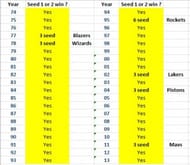So what really happens in the NBA Playoffs?
In the last 40 full seasons in the NBA, 33 winners have been a first or second seed in either conference, six have been a third seed and a certain Houston Rockets were the sixth seed in 1995 playoffs when they went on to sweep the Shaquille O’Neal-led Orlando Magic in four games.
Houston Rockets are definite outliers when compared to all the other winning teams, but they had something going for them that year.
Explore the NBA Draft 2024 with our free NBA Mock Draft Simulator & be the GM of your favorite NBA team.
They were the defending champions, had arguably the best player in the league at the time in Hakeem Olajuwon (Michael Jordan had just come back from his first retirement) and had traded for Clyde Drexler from Portland before the trade deadline, who turned out to be the second best player on the Rockets team in the playoffs that year. All of which meant that their record was not indicative of where they truly were heading into the playoffs.
It is highly unlikely that we will see many teams, if any, ranked as low as sixth winning the title in the NBA, where the regular season is 82 games long.
Over an 82-game season in the NBA, teams that finish near the top of the standings in either conference must be the best teams in that conference. That is true because over 82 games, the luck and chance factors are essentially eliminated. A straight knock-out tournament can throw some surprises but the way the NBA playoffs are set up, a huge surprise is unlikely.
Even if a fourth or fifth seed wins a series or two by beating the more favoured teams, the chances of that team winning three or four straight series on the road in a best-of-7 game format are very low.
As can be seen from the graphic, results in basketball, over a full regular season and even on a game by game basis, are one of the most predictable of any sports league and therefore, shouldn’t come as a huge surprise.
Most people would prefer to see a little more unpredictability in the outcomes in the NBA but that might be difficult as there are only so many tall people in America, and fewer who are good at basketball. That said, the regular season in the NBA is one of the most tedious affairs in any sport and basketball could do with a shorter duration than the usual 82 games. It’s still hard to see how the actual predictability would be reduced if that were done, but the perceived predictability would certainly be lowered.
A trend towards a ‘smaller’, ‘faster’ and shooting-based basketball might also reduce some of the certainty, but these things exist in cycles and big men will always have an advantage in the sport. And even if big men continue to be as important to the game, the growing popularity of NBA internationally is expected to improve parity. This is because of the growth in the pool of tall players available to choose from. The prime examples being Dirk Nowitzki and Yao Ming.
None of this implies that something is amiss for the viewers while watching the playoff games, since all that is required to make for an entertaining game is a ‘big enough’ chance for the underdog; that is sufficient to prevent people from turning off their television sets. And that is still there for the most part, even if the eventual outcome might seem quite predetermined.

